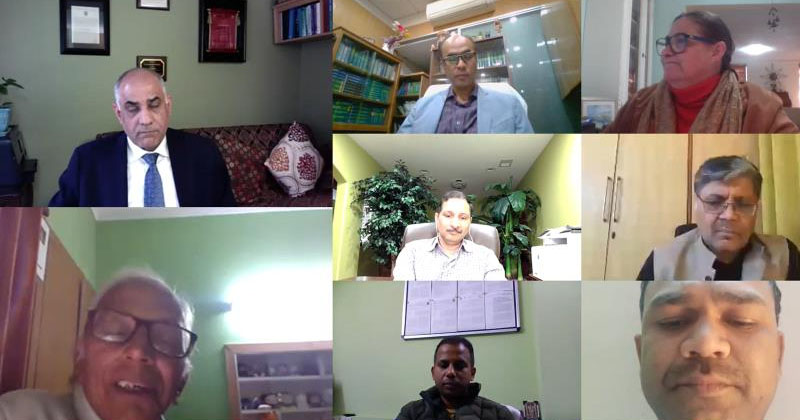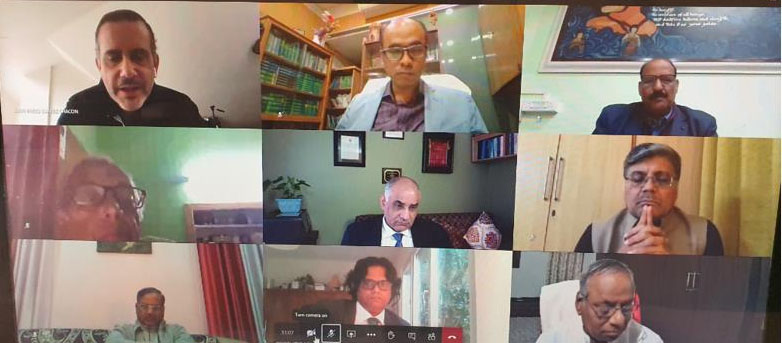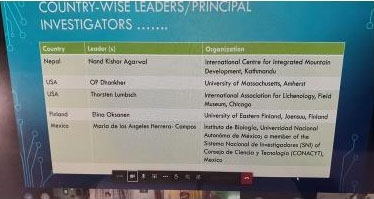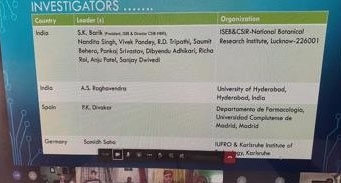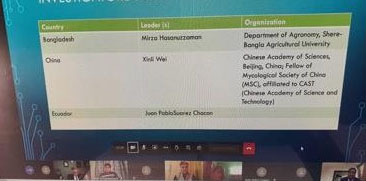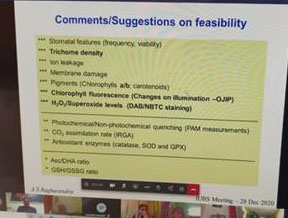IUBS-ISEB Initiation Workshop on
Environmental Education and Climate Change Adaptation
Science of Pollution-Tolerant and Climate Resilient Plants
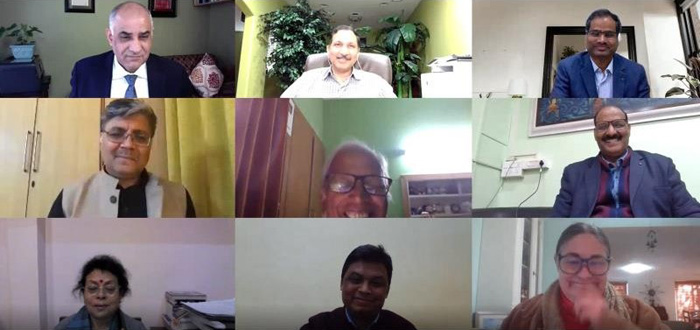
The initiation workshop of the IUBS-sponsored project entitled, “Environmental Education and Climate Change Adaptation: Science of Pollution-Tolerant and Climate Resilient Plants” was organized at CSIR-National Botanical Research Institute (CSIR- NBRI), Lucknow, India on December 28, 2020 from 7 pm to 11 pm (Indian Standard Time). In this workshop 14 leaders from 10 countries (China, Germany, Finland, Bangladesh, Spain, USA, Ecuador, Mexico, Nepal and India) participated. Besides, six resource persons viz., Dr. P.V. Sane, Lucknow, Prof. R.P. Singh, Lucknow, Prof. S.S. Sharma, Sikkim, Prof. D.C. Uprety, New Delhi, Prof. P.V. Vara Prasad, Kansas State University, USA, and Prof. M.K. Datta, Lucknow were specially invited to give their suggestions for the successful implementation of the project. The workshop was attended by all the scientists of Ecology and Environmental Science Division of CSIR- NBRI.
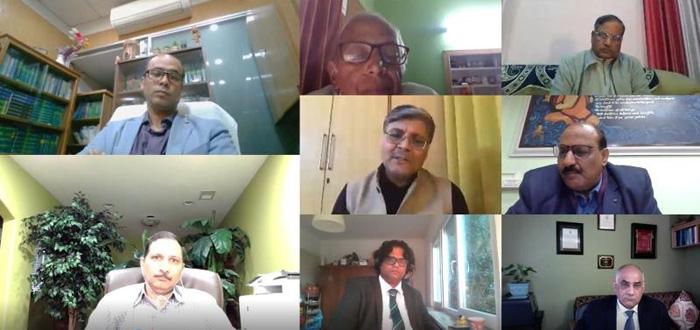
Introduction Session
At the outset, Prof S.K. Barik, Director CSIR-NBRI and President, ISEB welcomed all the participants who joined the workshop despite the holiday period and odd hours in their respective countries. Prof. Barik appraised the participants on the guidelines of IUBS for implementing the Scientific Programmes. He emphasized that IUBS provides seed funds to launch the programmes. Supplementary/additional funding need to be raised by the project leaders from other sources. He thanked all the project leaders for joining the project for the cause of science and society under the umbrella of IUBS. Further, Prof. Barik presented the details of the IUBS sanctioned project “Environmental Education and Climate Change Adaptation: Science of Pollution-Tolerant and Climate Resilient Plants”, which is being implemented during the triennium 2019-2022.
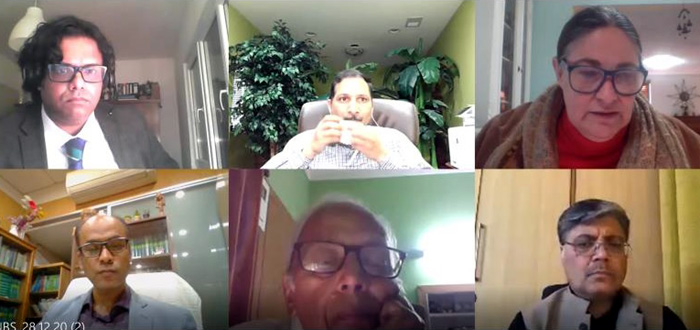
Presentations
Dr. Vivek Pandey made a presentation on “Screening Methods for Pollution-Tolerant and Climate-Resilient Plants”. He talked about six air pollutants/climate change variables viz., ozone, sulphur dioxide, particulate matter, warming, carbon dioxide and drought. He emphasized the importance of each variable and presented a list of parameters which can be used to assess relative sensitivity/tolerance of a plant species/crop variety against specific air pollutants and climate change related stress variables.
Following the presentation of Dr. Vivek Pandey, the invited Resource Persons and project leaders offered suggestions to improve the task of index development.
Resource persons appreciated the project and gave various valuable suggestions. Dr. Sane emphasized that while using APTI index, it should be clear that the index is not a unique character of a plant. It may vary among different geographic regions (due to edapho-climatic variations) in response to the pollution. He also suggested that the e-manual should be more comprehensive. Dr. Uprety gave suggestion that parameter like soil moisture status and relative growth yield should also be taken into consideration. Prof. Shanti Sharma, while appreciating the project, emphasized on the use of simplified methods and indices to decipher stomatal variability. Prof R.P. Singh talked about taking more soil parameters like, soil enzymes and soil fertility in to consideration. He also suggested to include combination of tolerant plants for combating urban pollution. Prof Vara Prasad emphasized the need to take on multiple challenges and more importantly to include civil administration on board for effective implementation of the project.
Prof. A.S. Raghvendra grouped the parameters, presented by Dr. Vivek Pandey into three categories based on their dependability for monitoring the sensitivity of plants and gave excellent suggestion to include a few more parameters such as: Stomatal frequency and viability, Trichome density, Chlorophyll a/b ratio, Ion leakage and ROS accumulation.
Dr. Raghvendra advised to follow simple monitoring methods for assessment such as colorimetry, change in illumination and dye. Mr. N.K. Agarwal suggested for working out the post-research plan particularly for effective integration with various Govt. schemes. Dr. Somidh Saha talked about importance of including micro-habitats and site specific selection criteria for tree plantation. Prof. Dhankar appreciated the plant selection criteria (morphological, physiological and biochemical aspects) but suggested also to consider the root architecture, root depth and soil microbiol diversity as indicators especially in the case of drought. Prof Oksanen’s suggestion was to consider the regional aspects while selecting climate change resilient plants.
Prof. Xinli Wei and Dr. Campos discussed how lichen species can be used for monitoring for climate resilience. She suggested that the project should ascertain where the lichen species would be sensitive to the climate change and air pollution leading to their extinction. Dr. Mirza was of the view to develop nondestructive methods for identifying resilient plants. He also suggested a well-planned method manual and prepare review articles to enhance networking.
Prof. Pradeep Divakar emphasized that the endophytic fungi have crucial role in adaptation and growth of pollution tolerant species and it would be nice to have a look on it after selecting the target species. They also produce certain secondary metabolites and that may play role to adapt high pollutant areas
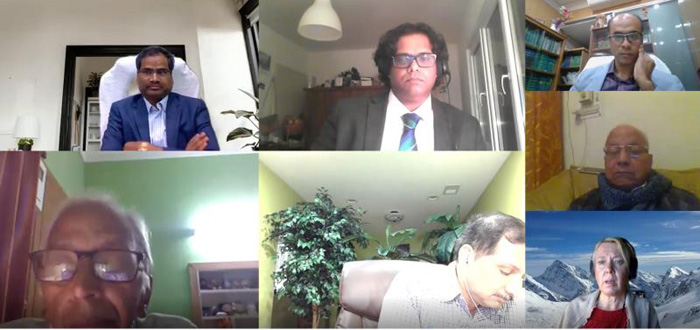
Development of partnership
Prof. M.K. Datta, AKTU, Lucknow regarding use of artificial intelligence and machine learning in the project.
Way Forward
Prof. S.K. Barik concluded the workshop by thanking all the resource persons for their suggestions, and project leaders for their observations and outlining the future course of action. For the way forward, he mentioned that many inputs have come through this meeting and many points which were thought to be taken up in the next meeting such as ecosystem level assessment parameters, have also been discussed. The lichen- specific parameters although discussed, need to be dealt in great detail. He requested everyone to send their inputs so that it can be compiled.
- Country-specific and domain-specific inputs e.g. Finland and lichens having very specific requirements may be written by the respective country project leaders/domain experts, and sent to the project team in India for inclusion in the document
- Prof Barik suggested that there is a need for all to sit again after 3 months to complete the document. The date for the next meeting would be mutually decided.
Dr. R.D. Tripathi proposed to Vote of Thanks.
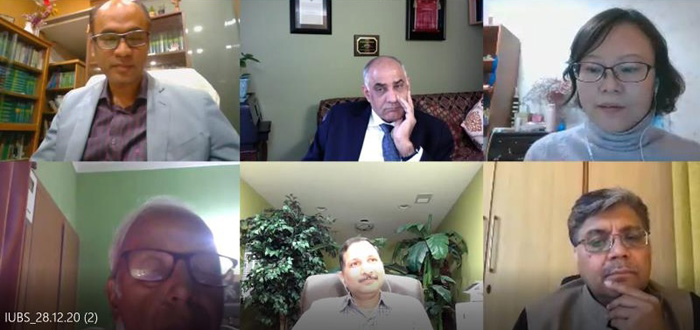
Nationalities and names of people attended the workshop:
- • Dr. N.K. Agrawal, Nepal
- • Dr. María de los Angeles Herrera Campos, Mexico
- • Juan Pablo Suárez Chacón, Ecuador
- • Prof. O.P. Dhankher, USA
- • Prof. P.K. Diwakar, Spain
- • Prof. Mirza Hasanuzzaman, Bangladesh
- • Prof. Elina Oksanen, Finland
- • Prof. A.S. Raghavendra, India
- • Dr. Somidh Saha, Germany
- • Dr. Xinli Wei, China
- • Prof. Thorsten Lumbsch, USA
From CSIR-NBRI and ISEB, India following people attended:
- • Prof S.K. Barik, Director CSIR-NBRI and President, ISEB
- • Dr. R.D. Tripathi, Secretary, ISEB
- • Dr. Nandita Singh, Additional Secretary, ISEB
- • Dr. Vivek Pandey, Joint Secretary, ISEB
Other participants from CSIR-NBRI
- • Dr. P.K. Srivastava, CSIR-NBRI
- • Dr. Shekhar Mallick, CSIR-NBRI
- • Dr. Dibyendu Adhikari, CSIR-NBRI
- • Dr. Soumit Behera, CSIR-NBRI
- • Dr. Richa Rai, CSIR-NBRI
- • Dr. Bikrama Singh, CSIR-NBRI
- • Dr. Anju Patel, CSIR-NBRI
- • Dr. Sanjay Dwivedi, CSIR-NBRI
Apart from this following resource persons also attended the workshop:
- • Dr. P.V. Sane, Lucknow
- • Prof. R.P. Singh, BBAU, Lucknow
- • Prof. S. S. Sharma, Sikkim Central University, Sikkim
- • Dr. D.C. Uprety, New Delhi
- • Dr. P.V. Vara Prasad, Kansas State University, USA
- • Prof. M.K. Datta, AKTU, Lucknow


